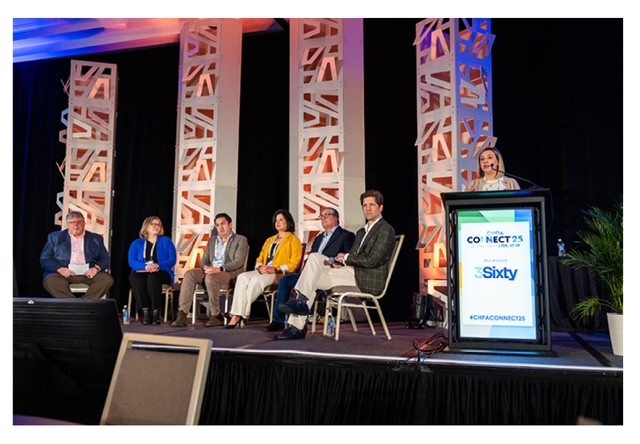David Madrid (VP, Innovation & Venture) Discusses Strategic Partnerships & Expanding Opportunities in Corporate Housing
David Madrid is VP of Innovation & Venture at AvalonBay Communities, where he leads the incubation of new products and programs to drive Net Operating Income (NOI), manages the company’s strategic investment portfolio and Venture Capital relationships, and chairs the Innovation Committee.
Corporate housing is evolving rapidly, with shifting lease structures, supply constraints, and new industry best practices redefining how multifamily owners and operators approach the space. I recently attended the Corporate Housing Providers Association (CHPA) Annual Conference and spoke on a panel about how we can leverage the current landscape to elevate partnerships, expand opportunities and market outlook, and navigate changes to drive NOI and reduce risk. Here’s an overview of what I shared on stage:

At AvalonBay, we are proud to be among the first movers in the corporate and furnished housing sector, setting trends and implementing best practices that are being embraced across the industry. Corporate housing represents furnished apartments, condos, or homes that are rented on a shorter-term basis, providing added convenience to people who need to stay somewhere longer than a hotel but less time than a traditional lease. Many other operators are now launching their own furnished and corporate housing programs to generate additional NOI or centralize their corporate housing processes as they increasingly recognize the value of corporate housing as a strategic tool.
When managed correctly, corporate housing is a strong business line. Corporate residents tend to be reliable tenants who pay rent on time and have relatively few issues throughout their lease term. However, there remains a stigma in the industry—primarily the perception that corporate housing providers frequently terminate leases early. While this can occur during economic downturns, it has led to an outsized perception of risk among some owners and operators.
To mitigate this risk, AvalonBay takes a strategic approach. We conduct rigorous screening and vetting of corporate housing providers and manage the mix of corporate tenants within our communities similarly to a diversified investment portfolio. This includes understanding the sectors in which corporate tenants operate, assessing the durability of their cash flows, and ensuring that no single community is overexposed to any one sector. Diversification across industries helps protect against downturns, as not all sectors are impacted equally during economic shifts.
By proactively engaging stakeholders and addressing lease flexibility concerns, we reinforce corporate housing as a value-add. This alignment enables agility, optimizes execution, and strengthens NOI while maintaining community stability.

Looking ahead to 2025, we expect a flat to slightly positive outlook for the corporate housing industry. After several years of volatility, the sector has reached a stable "new normal." While some sectors—such as government contractors—may face headwinds over the next 12–18 months, others, like corporate relocations and business travel, could see renewed strength with return-to-office trends.
Supply remains a challenge. Many property managers either limit or prohibit corporate housing, further constraining availability. Additionally, the corporate housing industry has undergone a fundamental shift in lease term structures. Historically, providers committed to long-term leases, but today, they increasingly match lease terms to tenant stays to minimize lease liability. This shift can create friction with property managers, who prioritize long-term leases.
Another challenge is seasonality. The peak leasing season for corporate housing (March–July) coincides with peak leasing for multifamily operators. Property managers generally prefer securing 12-month leases rather than 2–4-month corporate stays, particularly since leases expiring in late summer or early fall (August–September) are less ideal from an occupancy and rent capture standpoint. As a result, we are seeing a shift toward structuring leases at 8–9 months or 16+ months to better align lease expirations with optimal market conditions.
Transparency and trust create strong relationships that allow us to plan for these challenges. Clear expectations on lease terms, occupancy, and financial commitments provide stability while allowing partners operational flexibility. Regular performance reviews and open communication help us adapt to market shifts, ensuring these relationships remain resilient.
What’s Next for Corporate HousingScaling a corporate housing program requires strong internal alignment. Success isn’t just about external partnerships—it hinges on leasing, asset management, and operations teams viewing corporate housing as a strategic asset, not a risk. At AvalonBay, we prioritize education and cross-departmental collaboration to dispel misconceptions, highlight financial benefits, and position corporate housing as a complement to traditional leasing.
During CHPA, I discussed corporate housing as a strategic tool and how effective partnership management will separate market leaders from those facing volatility. By fostering collaboration and shared success internally and externally, we unlock new opportunities, enhance portfolio performance, and elevate the resident experience.
At the conference, we also addressed audience questions on the impact of AI, best practices for engaging and partnering with property managers, and how technology is shaping operational efficiencies. While innovation continues to play a growing role in the sector, corporate housing remains very much a relationship-driven business. Strong partnerships with property owners and managers are critical to long-term success, and fostering trust and collaboration will continue to be a competitive advantage.
As the corporate housing sector evolves, success will come to those who strategically manage risk, optimize lease terms, and build strong industry relationships. AvalonBay remains committed to leading these efforts—staying ahead of market shifts, refining our approach, and setting the standard for corporate and furnished housing to meet the demands of today’s short-term residents.
MEDIA INQUIRIES
/cloudfront-us-east-1.images.arcpublishing.com/avalonbay/3YNMETPXKRGUPNHHA4WKS7CK6A.jpeg)
4040 Wilson Blvd. Suite 1000
Arlington, VA 22203
T: (703) 329-6300
media_relations@avalonbay.com
Some of the materials above have been published by third parties and their content has not been confirmed by AvalonBay. The materials in this Newsroom have been made available for informational purposes only and do not constitute an offer to sell, or a solicitation of an offer to buy, securities. No part of the Newsroom materials shall form the basis of, or be relied on in connection with, any contract or investment decision under any circumstance for any purpose. The materials in this Newsroom may include forward-looking statements. Forward-looking statements, by their very nature, are subject to inherent risks and uncertainties are based on several assumptions, both general and specific, which give rise to the possibility that actual results or events could differ materially from expectations expressed in or implied by such forward-looking statements. These statements are not guarantees of future performance or events and AvalonBay cautions you against relying on any of these forward-looking statements. Please refer to the materials filed publicly by AvalonBay Communities, Inc. with the SEC, including its most recent Forms 10-K and 10-Q, for additional information about AvalonBay and about the risks and uncertainties related to its business, which may affect the statements made on this website.
/cloudfront-us-east-1.images.arcpublishing.com/avalonbay/TT6YL77BWFHH5FQVW4SYL7YSJM.jpg)